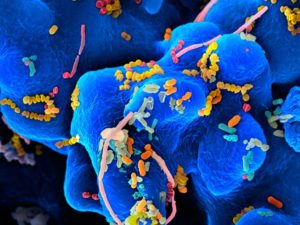 This study is noteworthy and relevant to humans (it was done on mice) because it may explain why so many people taking antibiotics get frequent viruses or seem more susceptible to infections. Once bacteria (both good and bad) are killed by antibiotics, then the community becomes unbalanced (dysbiosis), so that viruses may gain a foothold and a viral infection develops. In a healthy microbial community all sorts of microbes can be found, even ones we typically consider pathogenic, but the whole community keeps them in balance. One can say that "depletion of commensal microbiota also affects antiviral immunity".
This study is noteworthy and relevant to humans (it was done on mice) because it may explain why so many people taking antibiotics get frequent viruses or seem more susceptible to infections. Once bacteria (both good and bad) are killed by antibiotics, then the community becomes unbalanced (dysbiosis), so that viruses may gain a foothold and a viral infection develops. In a healthy microbial community all sorts of microbes can be found, even ones we typically consider pathogenic, but the whole community keeps them in balance. One can say that "depletion of commensal microbiota also affects antiviral immunity".
The study researchers said that the study findings were relevant to humans: that oral antibiotics could result in increased susceptibility to sexually transmitted infections, as well as other infectious viruses. Note: commensal microbes or commensalism is a the living together of two organisms (different species) in a relationship that is beneficial to one and has no effect on the other. Dysbiosis is microbial imbalance, the microbial community being "out of whack". From Science Daily:
Antibiotics may increase susceptibility to sexually transmitted infections
Commensal microbiota, populations of bacteria that inhabit the tissues of larger organisms, often have complex relationships with their hosts. Researchers have been aware for some time that commensal microbiota play a role in antiviral immunity by producing immune inductive signals that trigger inflammasome responses, among other things.
However, the role of dysbiosis on antiviral immunity hasn't been studied. Dysbiosis describes the loss of bacterial diversity within a microbiome, and the direct role that commensal microbiota play in antiviral immunity suggests that such loss would facilitate viral infections. Recently, a collaborative of Korean and Japanese scientists conducted a study into the effects of antibiotic-induced dysbiosis on antiviral immunity, and have published their results in the Proceedings of the National Academy of Sciences.
The researchers investigated the mechanisms of commensal microbial immunity on the genital mucosa by treating mice with antibiotics for four weeks and then exposing them to HSV-2. A control group received placebo. They report that the antibiotics caused dysbiosis within the vaginal microbiota, and resulted in a dramatic increase in innate immune response—specifically, they noted increases in an alarmin called IL-33, which blocked effector T cells from migrating into the vaginal tissues and secreting antiviral cytokines.
Antibiotic-treated mice succumbed to HSV-2 infection dramatically faster than control mice. They exhibited more severe pathology and all mice treated with antibiotics prior to viral exposure died within 11 days of infection. "Taking these data together, we find that depletion of commensal bacteria results in a severe defect in antiviral protection following mucosal HSV-2 infection," the researchers write.
By analyzing stool and vaginal washes from both groups of mice, they determined that antibiotic treatment induced an imbalance in the microbial composition of the vaginal mucosa. Further, they were able to determine that no single species of bacteria was responsible for the antiviral immunity effects of the commensal microbiome; rather, it was the imbalance of the microbiotic population that accounted for the effects.

The human mouth hosts a variety of microbes, some taking up residence on the mouth lining (blue) within days after birth. Credit: Martin Oeggerli (National Geographic)
